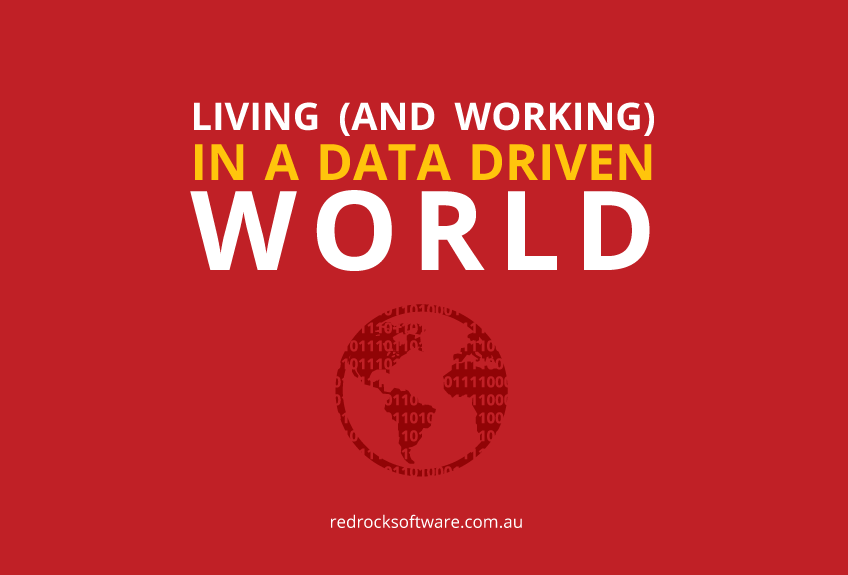
08 Oct Living (and working) in a Data Driven World
Technology is becoming more and more ingrained in our everyday lives, both at work and everywhere else. Remember the technology scares of Y2K? Now we’re afraid to go a few minutes without checking our smartphones. We think we know all there is to know about our little pieces of tech.In reality, though, our technology probably knows more about us. That’s right- the machines really are watching us. Don’t worry, though, it’s not as bad as a big budget Hollywood movies would lead us to believe. In fact, it’s probably a good thing- especially when it comes to business.
You’re already in the data business
That’s right- whether you knew it or not, you’re already a big player in big data. According to IBM, humans are creating 2.5 quintillion bytes of data per year. For some context, they have found that 90% of the world’s data has been created in the last two years. Now that more and more data is being recorded, what’s the best way to take advantage?You record business data everyday, even if you aren’t utilising custom software applications that would make this job much easier. Every time you input an order or write down a contact number, that’s data. The business card you slipped in your pocket? Data. Any change to an Excel sheet…that’s data, too.Of course, if all of this data is sitting in multiple different programs (or pockets, for that matter) then it’s not doing anything. In order to get the biggest benefits, your programs need to start communicating with each other. If your company opts in to custom developed software, for starters, your business really needs to make sure their custom developed software has data functionality heavily involved. Chances are it does.
Integration for organisation
One of the biggest benefits of custom software applications development is the idea that it can be tailored specifically around your company. There are many advantages to this, essentially, you should end up with the perfect software that will handle the vast majority of your daily business operations.Depending on your industry, these operations will vary. However, the point remains the same. The more processes that are run through your company’s specific software, the more data you will inevitably end up gathering and being able to use. We’re talking client lists, inventory, vendors, employee efficiency- they should all be kept in the same place. That way, analysis can be performed on more aspects of the business.It also depends on the size of your particular business however, unless it’s a one person operation, there are likely going to be different people and departments that need to work together. Rather than keeping potentially important information locked away on a hard drive somewhere, it should be kept within the enterprise software and accessible to anyone who needs it.The data is there, why not make it work for the whole company?
Customers are full of data
Your company isn’t the only one utilising more and more technology. Your customers are too. Customers want their opinion to be heard on review sites. This includes websites like Yelp or even just by voicing their discontent (or happiness) on Twitter or Facebook. It’s never been easier to actually listen to customer feedback, and to respond- instantly in most cases. Plus, you can set up ways of tracking how many people are talking about your company.The goal is to use data gained on social media to both improve your business processes and ensure satisfied customers. They’re likely to be repeat business and even to recommend you to others via the internet since they are already there.Customers expect the system to remember them- and they respond to it. Amazon is one of the first businesses to really master this strategy of directly targeted advertising. The site keeps track of purchases that customers have made, then recommends them purchases based on their tastes. This is a stark contrast of the old way of doing things, which was more of a “brute force” method of trying to push a product on everyone and hoping some of the people were interested.The same targeted strategy is also utilised by many non-sales tech companies like Netflix or Pandora too.It’s not like being tracked on a website anymore- customers now willingly submit to giving up their data. In fact, many of them thrive on it. The advent of wearable technology is a great example. These devices are literally kept on the body to track day-to-day movements- by choice. And people love them!Mobile apps are no different. People are spending more time using apps than they are accessing the internet with mobile browsers, and the apps are a great way to find out about user habits. It’s also a good way to get feedback and to spend more time targeting people who might actually be interested in your business, rather than wasting time chasing the wrong clientele- that’s really the goal of utilising data for business. 


